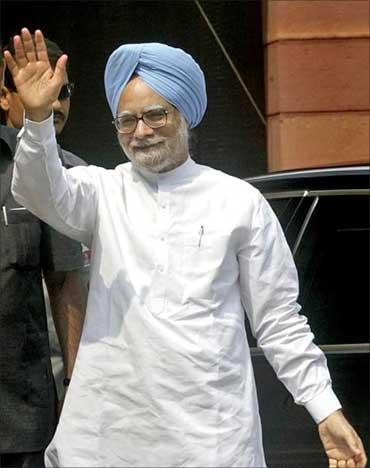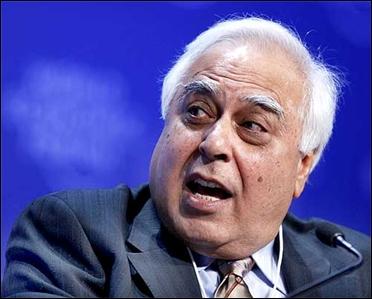 | « Back to article | Print this article |
Govt to look into telecom operators' concerns: PM
Amid telecom operators seeking lower levies and early resolution of a dispute over 3G roaming, Prime Minister Manmohan Singh said on Wednesday the government will look into their concerns and formulate forward-looking policies to sustain growth in the sector.
"I am aware of some concerns of the telecom industry regarding government policy in the telecom sector. I wish to reassure the industry of the government's full commitment to sustainable growth, creativity and enterprise in this vitally important sector of our economy," he said, inaugurating the India Telecom Summit in New Delhi.
Click NEXT to read further. . .
Govt to look into telecom operators' concerns: PM
Singh's statement comes in the backdrop of a recent meeting of the chief executive officers of top telecom firms, including Bharti Airtel, Vodafone and Reliance Communications, seeking his intervention to sort out differences between them and the
Telecom Ministry over issues ranging from one-time spectrum charges to 3G roaming and a uniform licence fee.
Noting that the two National Telecom Policies of 1994 and 1999 were major initiatives to propel growth in the sector, the Prime Minister said the government is working on the NTP-2011 with a special emphasis on affordable and quality telecom services in rural and remote areas of the country.
Click NEXT to read further. . .
Govt to look into telecom operators' concerns: PM
At the same time, he asked the industry to look ahead in giving a new sense of momentum to the sector.
He also emphasised on the need for promoting domestic telecom equipment manufacturing and R&D in the sector.
The India Telecom Summit is organised jointly by the Telecom Ministry and industry chamber Federation of Indian Chambers of Commerce and Industry.
India's telecom sector is one of the fastest growing in the world, he said, adding, "Keeping in view strategic and security interests, there is an urgent need to give impetus to domestic R&D and manufacturing in the telecom sector."
Click NEXT to read further. . .
Govt to look into telecom operators' concerns: PM
"A thriving telecom manufacturing industry would have a large positive impact on many other elements of the electronics manufacturing value chain, apart from generating other benefits like additional employment," the Prime Minister said.
He added that the government is committed to achieving success in this vital sector of the country's economy.
"We will work closely with all stakeholders to build upon what we have achieved," he said.
Telecom Minister Kapil Sibal, while unveiling the draft National Telecom Policy-2011 (NTP-2011) in October, had set a target for meeting 80 per cent of the India's telecom sector requirement for equipment through domestic manufacturing by 2020.
Click NEXT to read further. . .
Govt to look into telecom operators' concerns: PM
As per the draft NTP-2011, domestic telecom equipment demand is estimated to be of the order of Rs 2.5 lakh crore (Rs 2.5 trillion) by the end of 12th Five-Year Plan (2012-2017).
According to the Telecom Regulatory Authority of India, only 12-13 per cent of all locally made products produced with the aid of foreign vendors in 2009-10 were used in the sector.
However, purely India-made products formed just 3 per cent of the total market, as the Indian telecom sector is largely dependent on imports.
Speaking at the event, Sibal said, "The Indian telecom sector will require an investment of Rs 6.5 trillion in the next five years."
Click NEXT to read further. . .
Govt to look into telecom operators' concerns: PM
He added that a stable policy regime and regulatory environment helped the telecom sector shine in the Indian economy.
On broadband connectivity, Singh said the draft NTP-2011 envisages 'broadband on demand' by the year 2015 and aims to achieve 175 million connections by 2017 and 600 million by 2020, with a minimum download speed of 2 megabytes per second.
The draft NTP-2011 also envisages high speed and high quality broadband access in all village Panchayats through an optical fibre network by the year 2014.
"Our government has recently approved a scheme for creation of a National Optical Fibre Network, the cost of the initial phase of which is estimated to be about Rs 20,000 crore (Rs 200 billion)," he said.
Click NEXT to read further. . .
Govt to look into telecom operators' concerns: PM
An equal amount is also envisaged to be invested by the private sector to complement the National Optical Fibre Network infrastructure for providing access services to individual users, Singh said.
Currently, the Indian telecom sector is grappling with a number of issues related to scarcity of spectrum, huge imports of telecom equipment and a lack of transparency in policies.
The draft NTP-2011 has also called for enacting a separate Spectrum Act, which will deal with all issues related to wireless (spectrum) licences and re-farming/withdrawal of allotted spectrum, as well as pricing, sharing and trading of airwaves.






